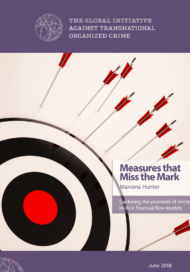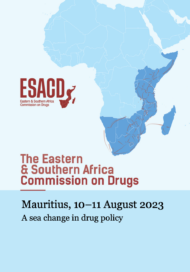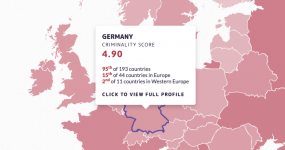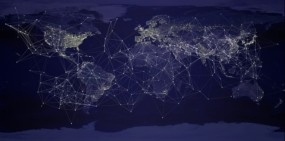Abajo en español.
In early December, the Global Initiative against Transnational Organized Crime participated in the 17th International Anti-Corruption Conference (IACC) in Panama City, Panama.
The biennial conference brings together heads of state, civil society, the private sector, and other actors to examine and tackle the increasingly sophisticated challenges posed by corruption. This year’s IACC, hosted by the Panamanian government and organized by the IACC Council and Transparency International, sought to build on previous conferences in fostering networking, cross-fertilization, global exchange of experiences in order to promote international cooperation among government, civil society, the private sector, and citizens.
Peter Tinti, with the support of the German Government, represented the Global Initiative as part of a panel session organized by the U4 Anti-Corruption Resource Centre, titled “Corruption and Migration: Connecting the Flows of Money and Refugees.” During the panel presentation, Tinti shared findings as a result of ongoing research conducted by the Global Initiative on the role of corruption within the business model of migrant smuggling networks. Citing examples from Africa, but in particular in Niger, Tinti stressed the need to understand the broader political economies within which these networks operate.
In many contemporary contexts, migrant smuggling networks are deeply enmeshed within local political and security structures, relying on corruption in order to carry out their activities. In the case of Niger, for example, where government and security officials, as well as certain marginalized communities rely on the migrant smuggling industry to sustain themselves, poorly designed interventions meant to stem irregular migrant flows carry a significant risk of upsetting local balances of power predicated on the political economy of migrant smuggling. A crackdown on migrant smuggling that fails to account for the actors and communities for whom smuggling is a source of livelihoods, therefore, could come at the expense of stability in an already volatile region. Unless serious measures are taken to reduce demand for smuggler services, measures that seek to increase border control are likely to create more opportunities for corruption and put migrants at greater risk.
For more on these particular dynamics as they pertain to the northern Niger and southern Libya, please see a recent report, “The Niger-Libya Corridor: Smugglers’ Perspectives” published by the Global Initiative against Transnational Organized Crime in partnership with the Institute for Security Studies.
IACC: Corrupción y Migración, conectando los flujos del dinero y los refugiados
A principios de diciembre, La Iniciativa Global contra La Delincuencia Organizada Transnacional participó de la 17º Conferencia Internacional Anti-corrupción (IACC) en la ciudad de Panamá.
La conferencia, que se celebra cada dos años, convoca a jefes de estado, la sociedad civil, el sector privado y otros actores a fin de evaluar y abordar los complejos desafíos de la corrupción. La IACC de este año, presentada por el gobierno de Panamá y organizada por el Consejo de IACC y Transparencia Internacional, buscó construir sobre la base de conferencias pasadas en el fortalecimiento de las redes de contacto y el intercambio global de ideas y experiencias con el objeto de promover la cooperación internacional entre gobierno, sociedad civil, el sector privado y los ciudadanos.
Peter Tinti, con el aval del Gobierno de Alemania, representó a la Iniciativa Global como parte del panel organizado por el Centro de Recursos Anti-Corrupción U4 (U4 Anti-Corruption Resource Centre) titulado “Corrupción y Migración, conectando los flujos del dinero y los refugiados”. Durante la presentación, Tinti compartió los hallazgos en la investigación realizada por la Iniciativa Global sobre el rol de la corrupción dentro del modelo de negocios de las redes de tráfico de migrantes. Con ejemplos de casos que ocurren en Africa, pero en particular en Nigeria, Tinti resaltó la necesidad de comprender las económicas políticas dentro de las cuales operan estas redes.
En muchos contextos actuales, las redes de tráfico de migrantes están profundamente entrecruzadas con estructuras políticas y de seguridad locales que dependen de la corrupción para llevar adelante sus actividades. En el caso de Nigeria, por ejemplo, en donde el gobierno y los oficiales de seguridad, como así también ciertas comunidades marginadas, dependen de la industria del tráfico de migrantes para auto-sustentarse, un mal diseño de las intervenciones orientadas a eliminar los flujos migratorios irregulares conlleva un riesgo importante de distorsionar el equilibrio de poder local basado en el tráfico de migrantes. Un ajuste de riendas sobre el tráfico de migrantes que no logre dar respuestas a los actores y comunidades para quienes el tráfico es su forma de sustento podría costar la estabilidad de una región ya volátil. A menos que se tomen medidas serias para reducir la demanda de estos servicios, es probable que las iniciativas en torno al aumento de control de fronteras generen más oportunidades para la corrupción y expongan a los migrantes a mayores riesgos.
Para más información sobre estas dinámicas particulares en el norte de Nigeria y el sur de Libia, vía nuestro informe reciente “The Niger-Libya Corridor: Smugglers’ Perspectives”, publicado por la Iniciativa Global contra la Delincuencia Organizada Transnacional en conjunto con el Institute for Security Studies.



